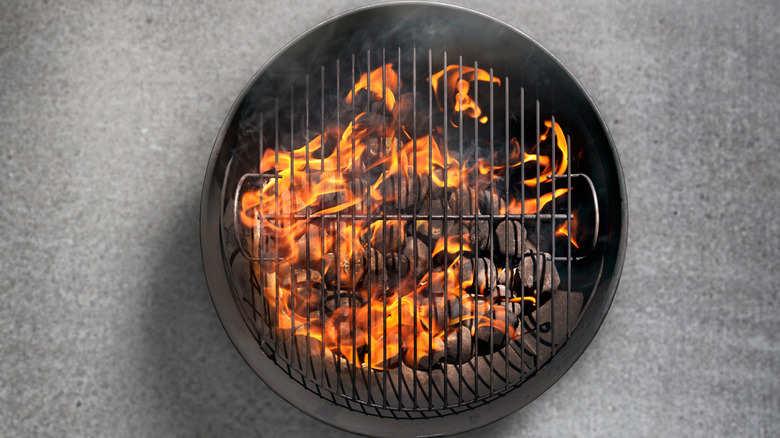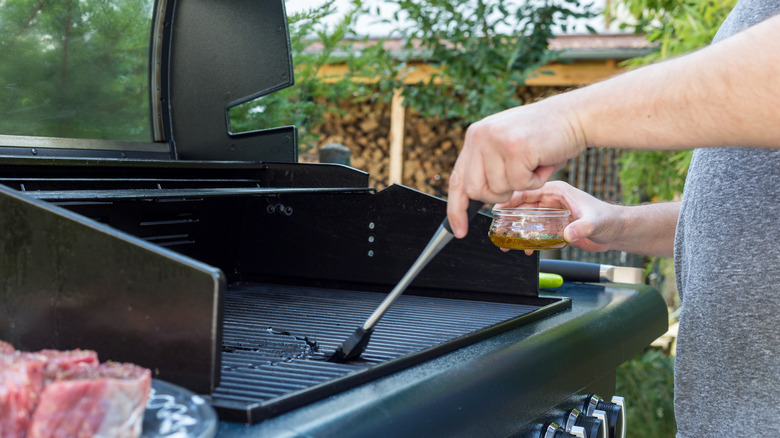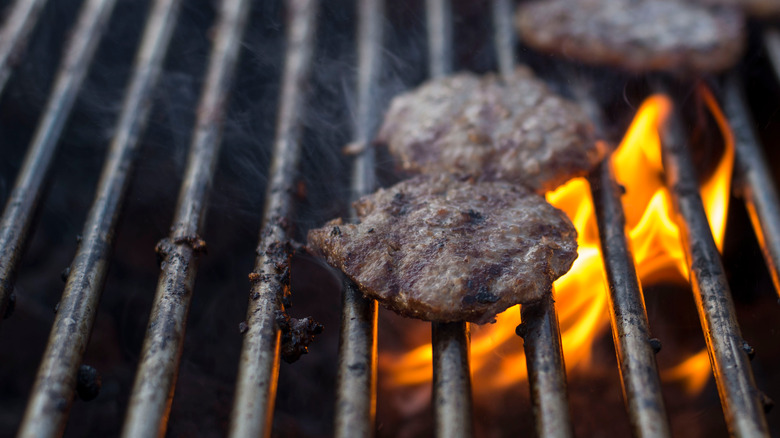How To Oil Your Grill Grates Correctly And Avoid A Fiery Flare-Up
Cooking outdoors over open flames with the food sitting on metal grates is truly spectacular, not to mention the smokey deliciousness of the finished grilled dish. But way before you place the meats or vegetables on the grill, a critical step that'll help you grill like a master is oiling those grates.
There are two benefits to oiling your grates. First, it prevents food from sticking to the metal and tearing apart, especially when cooking more delicate foods like lean cuts of meat or fish. Secondly, it's great for keeping your grates rust-free and lasting longer. However, you'll need to follow the right steps (and use the right gear) to prevent flames from flaring up, since this can disrupt the grilling process and pose a safety hazard. Luckily, the process is pretty straightforward.
First, clean the grill thoroughly. Get it as hot as it can go for a few minutes — this will burn any stuck-on food, turning it into ash and making it much easier to remove. Then, use a grill brush to scrub the grates. Once they're clean, you should apply the cooking oil with an old kitchen towel or cotton cloth. Hold the cloth lengthwise, roll it into a log-like shape, and tie it with twine on either end. Use tongs to dip the cloth bundle in a bowl of oil and gently rub the cloth across the grill grates to coat them with oil. Besides getting the method down pat, there are several things to keep in mind for flare-free oiling.
More tips on oiling your grill grates
The most critical elements when oiling your grill grates are the tools and type of cooking oil you use. One easy way to avoid flare-ups is to stay away from cooking oil sprays or basting brushes, which are difficult to control, and, in the case of aerosolized sprays, prone to exploding. A folded cotton cloth is also the ideal applicator because it's more durable than paper towels.
When it comes to the type of cooking oil, go for ones with a high smoke point and a neutral flavor. Grapeseed, canola, and peanut oil are some of the best with smoke points above 400 degrees Fahrenheit. If you're in doubt, just grab a vegetable oil since most actually have a high smoke point.
Finally, is your grill an oldie that you've used for a while or is it brand-new? For brand-new grill owners, there's one extra step to do before oiling the grates: Fire up the grill on high heat and leave it for an hour. The protective coating on the grill will burn off and get rid of any strange odor. After that, you can proceed to oil the grates as usual.
What to do if you get flare-ups
Even after doing everything by the book, it's still possible to end up with some flare-ups. In fact, if you've grilled more than a few times, you know that small flare-ups are a normal occurrence. Most often, you don't need to do anything about these small bursts of flame, they'll just die down. If you were in the process of oiling the grates, stop immediately because that's a sign the oil is dripping in the fire below. You can then wipe the grate to remove the excess oil.
The problem comes when a small flare-up turns into a grease fire. And this is the reason you need safety measures in place just in case (via Delta Liquid Energy). The most basic precaution is to have the grill lid on hand (and shutting off the gas tank if there is one). Covering the fire with a lid will deprive it of oxygen so it'll extinguish itself in no time. Alternatively, throw baking soda (not baking powder) on the flame and it will extinguish the fire. In case of more serious fires, keep a fire extinguisher nearby to put out any unrelenting flames.


